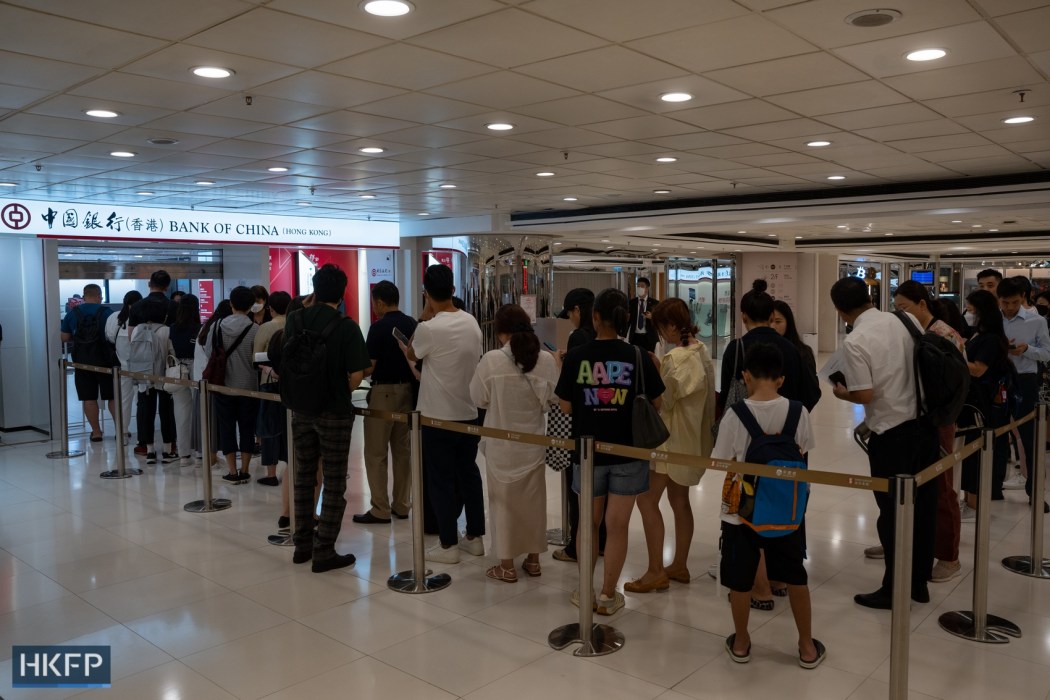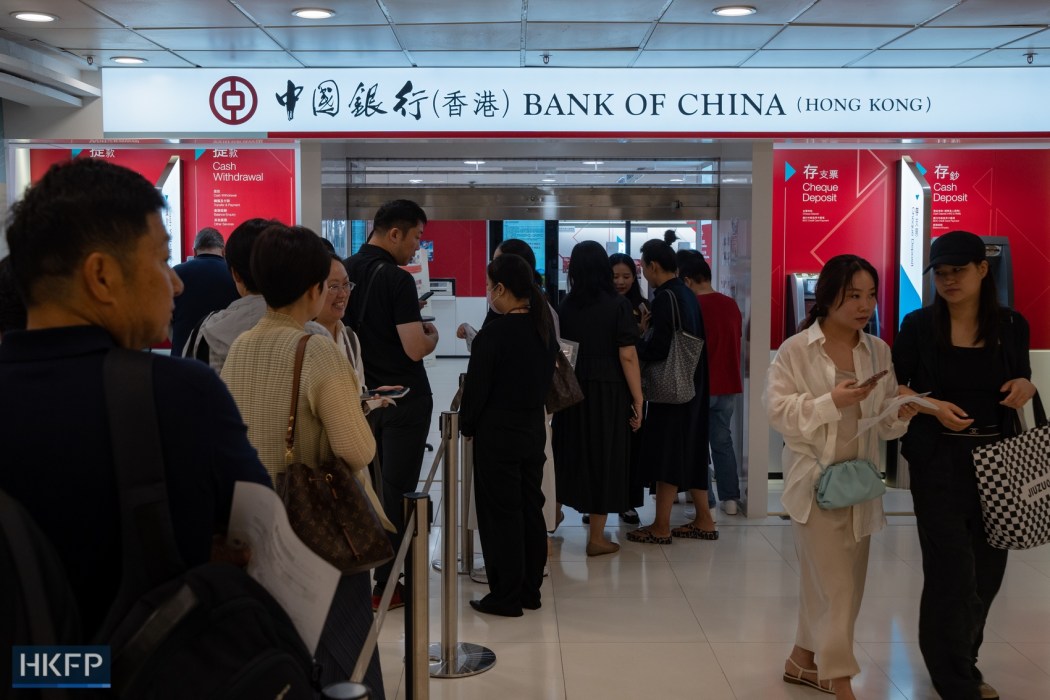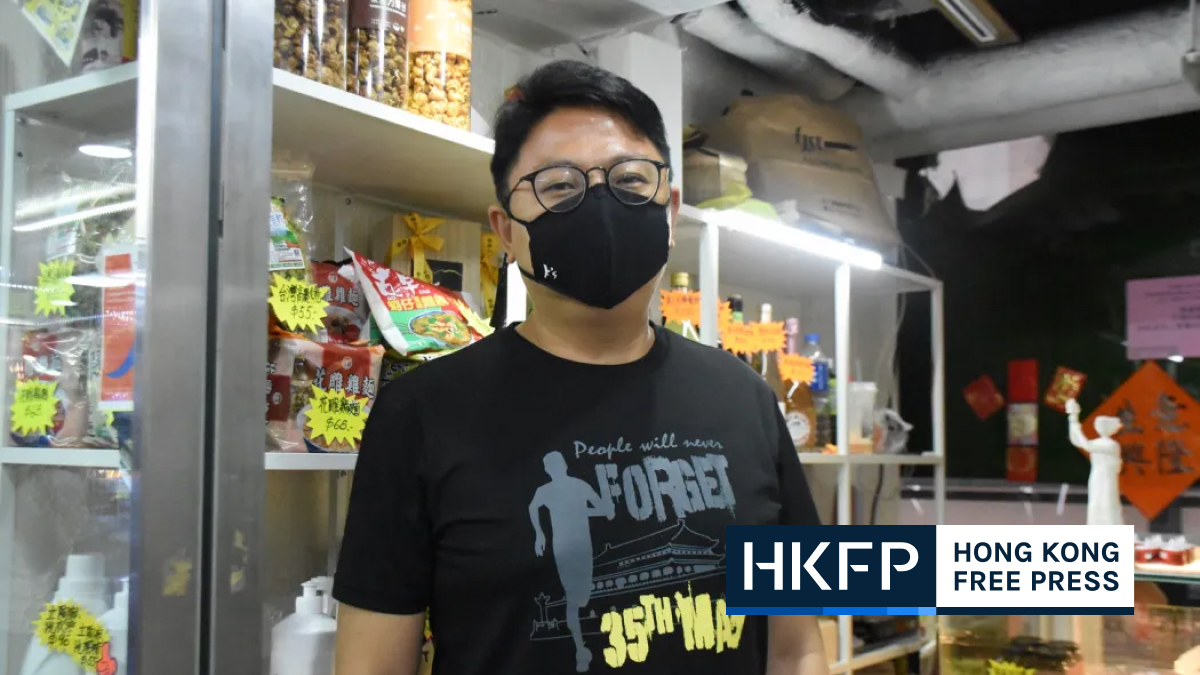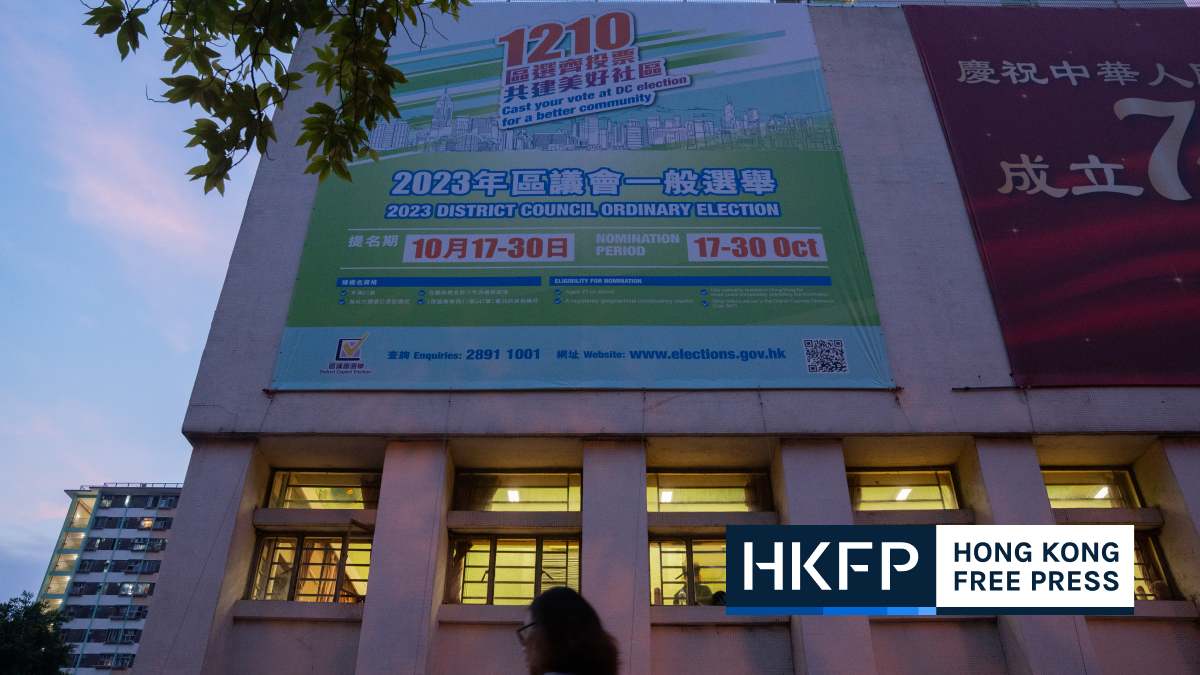After a journey of hundreds of miles from Henan province in north-central China, Wong arrived at a Tsim Sha Tsui branch of the Bank of China Hong Kong (BOCHK) at 5.30 am. She managed to secure first place in a queue that had grown to nearly 60 people before the bank opened its doors at 9 am.

Like Wong, all those waiting in line on Tuesday last week spoke Mandarin and all were there for the same purpose – to open new accounts amid growing economic uncertainty in mainland China.
“We travelled with kids this summer and purchased insurance policies in Hong Kong. We had to set up a new account to transfer money from the mainland to pay our insurance fees,” Wong, in her 40s, told HKFP in Mandarin. She requested that only her surname be used.
Over the past decade, savings insurance plans in Hong Kong have been seen as a way to transfer money out of mainland China for financial safety, life protection and high interest rates. Some people pay the equivalent of hundreds of thousands of US dollars per year into such plans.
Recently, there has been a surge in mainland Chinese purchasing insurance in Hong Kong. According to the city’s Insurance Authority, new business premiums from mainland Chinese visitors in the first half of 2023 were HK$31.9 billion, around 21 per cent higher than the HK$26.3 billion in the first six months of 2019.
| 💡HKFP grants anonymity to known sources under tightly controlled, limited circumstances defined in our Ethics Code. Among the reasons senior editors may approve the use of anonymity for sources are threats to safety, job security or fears of reprisals. |
Sindy, a Hong Kong insurance agent with over 10 years’ experience, told HKFP that mainland China’s weak post-pandemic economy and Beijing’s tightening control over the market had left residents feeling “unstable, unsafe and insecure.” She asked to use a pseudonym due to the sensitive nature of the topic.
“Mainland Chinese clients were setting up Hong Kong bank accounts before the pandemic. Most had also bought local insurance policies – they needed an account to pay regular fees,” Sindy said. “But recently, the motivations behind opening an account are more about asset allocation and enhancing a sense of security.”

As a result, Hong Kong banks are seeing a growing number of mainland clients. On the Chinese social media site Xiaohongshu, the hashtag “opening new accounts in Hong Kong” has been trending, with people providing guides on the procedures at various banks.
A young programmer from Beijing who gave his surname as Chen said he had travelled to Hong Kong to open an account in order to buy US stocks.
Chinese authorities have banned residents from exchanging US stocks through online brokers – such as Hong Kong-based Bright Smart Securities – since February. In May, Chinese brokers, including Futu Securities and Tiger Brokers, pulled their apps from the mainland Chinese market.

The BOCHK branch at the China Hong Kong City commercial complex is the most popular choice to open accounts as it is close to both the high-speed railway station and the ferry pier, providing direct links to several mainland cities.
In recent months, people have been arriving as early as 5 am to get a place in the queue since latecomers risk missing out on the branch’s daily quota of 60 new accounts. Those who arrive in time can receive a bank card the same day, after submitting documents such as Chinese identity cards and proof of address.
‘Deposits special forces‘
Many would-be customers have studied interest rates before heading to Hong Kong.
Simon, who had arrived from Shenzhen by high-speed train, told HKFP he had come to Hong Kong specifically to open an account. “The trend has gained popularity recently, as time deposit interest rates are much higher in Hong Kong than in the mainland. A few of us came to set up accounts today,” Simon (a pseudonym) said in Mandarin.
Hong Kong banks currently offer interest rates of around four per cent for Hong Kong dollar time deposits, while large amounts and US dollars see higher rates. In mainland China, time deposits offer less than three per cent.

The military-inspired hashtag “deposits special forces” has trended on Xiaohongshu since early this year, with people comparing the interest rates offered by different banks and then taking high-speed trains across provinces to open new accounts paying higher interest.
Amid heated online discussion, they cite several reasons for their urgency in opening new time deposits, including low confidence in the Chinese stock and real estate markets as well as falling interest rates on the mainland.
The property industry, which accounts for about 30 per cent of China’s gross domestic product, has been in crisis since Beijing implemented policies restricting developers’ financing in 2020. Exports, another pillar of the Chinese economy, slumped in the second quarter of 2023.
Beijing has cut interest rates three times since June to try to boost consumption, leading to a continuous depreciation of the renminbi (RMB). Interest rates in Hong Kong, whose currency is pegged to the US dollar, have risen in line with the United States.
Chinese regulators have also reportedly asked insurance companies to lower the yield for new investment products below three per cent from July 31. In Hong Kong, insurers usually provide savings insurance with around six per cent guaranteed interest.
A sense of insecurity
Cecilia, a Hong Kong insurance agent serving middle-class mainland professionals, said her clients had grown more anxious recently. Since May, an increasing number had been inquiring about opening bank accounts in Hong Kong.
“The economy is experiencing a downturn. The [central] government wants people to consume instead of save. However, people are not consuming because they feel insecure,” Cecilia said.
Beijing announced that the Consumer Price Index, the main gauge of inflation, fell 0.3 per cent in July, raising concerns that the world’s second-largest economy was slipping into deflation.

Cecilia said a laundry list of factors had fuelled feelings of insecurity, such as strict Covid-19 lockdowns and quarantine measures over the past three years, crackdowns on various sectors, the recent move to stop publishing the youth unemployment rate, and the falling currency.
“Mainland Chinese have mixed feelings. They don’t want to buy US dollars with RMB now because it will result in significant losses. But they also think the depreciation will continue and they have to sell RMB as soon as possible,” Cecilia said.
Mainland banks, however, restrict nationals to buying a maximum of US$50,000 a year in foreign currency. And they are not allowed to carry more than the equivalent of US$5,000 in foreign currency when travelling abroad, including to Hong Kong.
Purchasing large-sum savings insurance plans through UnionPay cards was once seen as a means of moving money out of the country. But Beijing tightened its grip over capital flows in 2016, banning people from buying non-consumption insurance policies through UnionPay.
Some risk reallocating their money through “underground banks,” a financial area that has been in Beijing’s crosshairs. Earlier this month, Chinese authorities arrested the founder and CEO of an immigration agency over an “illegal exchange of foreign capital.”
Cash is king
To cater for demand, some local bank branches have even extended opening hours and recruited more staff.

However, Andy, a Hong Kong insurance agent who requested a pseudonym, told HKFP that Beijing’s controls make it difficult to move a lot of money to Hong Kong. “Recently, a new trend is that clients are choosing to carry cash from the mainland to Hong Kong from time to time to allocate money.”
HKFP has reached out to BOCHK, HSBC and Standard Chartered for comment and to enquire about up-to-date figures regarding the number of new account openings, but did not receive any responses.

According to the Hong Kong Monetary Authority, banks in Hong Kong must conduct due diligence on customers and undertake other measures to comply with anti-money laundering laws when opening new accounts.
Emily (pseudonym), who works in compliance for a private bank, told HKFP that banks in the city were always accessible for non-local residents to open new accounts, as long as enough documents were submitted.
But in terms of due diligence and compliance audits, mainland China presented more risk, she added.
“Mainland clients have felt more and more insecure this year. The middle-class is the most worried, ” said Cecilia, the insurance agent. “The rich have already made plans [to put their money] in foreign countries. ”
Support HKFP | Policies & Ethics | Error/typo? | Contact Us | Newsletter | Transparency & Annual Report | Apps
Help safeguard press freedom & keep HKFP free for all readers by supporting our team

LATEST FROM HKFP
HKFP has an impartial stance, transparent funding, and balanced coverage guided by an Ethics Code and Corrections Policy.
Support press freedom & help us surpass 1,000 monthly Patrons: 100% independent, governed by an ethics code & not-for-profit.







